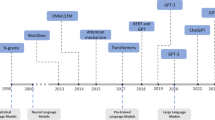Abstract
An adaptive language modeling method is proposed in this paper. Instead of using one static model for all situations, it applies a set of specific models to dynamically adapt to the discourse. We present the general structure of the model and the training procedure. In our experiments, we instantiated the method with a set of domain dependent models which are trained according to different socio-situational settings (almosd). We compare it with previous topic dependent and socio-situational setting dependent adaptive language models and with a smoothed n-gram model in terms of perplexity and word prediction accuracy. Our experiments show that almosd achieves perplexity reductions up to almost 12% compared with the other models.
Access this chapter
Tax calculation will be finalised at checkout
Purchases are for personal use only
Preview
Unable to display preview. Download preview PDF.
Similar content being viewed by others
References
Mikolov, T., Karafiát, M., Burget, L., Cernocký, J., Khudanpur, S.: Recurrent neural network based language model. In: INTERSPEECH, pp. 1045–1048 (2010)
Foster, P., Skehan, P.: The influence of planning and task type on second language performance. Studies in Second Language Acquisition 18, 299–323 (1996)
Wiggers, P.: Modelling Context in Automatic Speech Recognition. Ph.D. thesis, Delft University of Technology (2008)
Wiggers, P., Rothkrantz, L.: Combining Topic Information and Structure Information in a Dynamic Language Model. In: Matoušek, V., Mautner, P. (eds.) TSD 2009. LNCS, vol. 5729, pp. 218–225. Springer, Heidelberg (2009)
Iyer, R., Ostendorf, M.: Modeling long distance dependencies in language: Topic mixtures versus dynamic cache models. IEEE Trans. Speech Audio Process. 7, 236–239 (1999)
Iyer, R., Ostendorf, M., Rohlicek, J.R.: Language modeling with sentence-level mixtures. In: HLT 1994: Proceedings of the Workshop on Human Language Technology, pp. 82–87. Association for Computational Linguistics, Morristown (1994)
Shi, Y., Wiggers, P., Jonker, C.M.: Language modelling with dynamic bayesian networks using conversation types and part of speech information. In: The 22nd Benelux Conference on Artificial Intelligence, BNAIC (2010)
Shi, Y., Wiggers, P., Jonker, C.M.: Combining Topic Specific Language Models. In: Habernal, I., Matoušek, V. (eds.) TSD 2011. LNCS, vol. 6836, pp. 99–106. Springer, Heidelberg (2011)
Bellegarda, J.: Statistical language model adaptation: review and perspectives. Speech Communication 42, 93–108 (2004)
Brown, P.F., Pietra, V.J.D., de Souza, P.V., Lai, J.C., Mercer, R.L.: Class-based n-gram models of natural language. Computational Linguistics 18, 467–479 (1992)
Rosenfeld, R.: A maximum entropy approach to adaptive statistical language modelling. Computer Speech & Language 10, 187–228 (1996)
Seymore, K., Rosenfeld, R.: Using story topics for language model adaptation. In: Kokkinakis, G., Fakotakis, N., Dermatas, E. (eds.) EUROSPEECH. ISCA (1997)
Adda, G., Jardino, M., Gauvain, J.L.: Sixth European Conference on Speech Communication and Technology, Eurospeech 1999, budapest, Hungary, September 5-9. ISCA (1999)
Wiggers, P., Rothkrantz, L.J.M.: Topic-based language modeling with dynamic bayesian networks. In: Proceedings of the Ninth International Conference on Spoken Language Processing, pp. 1866–1869 (2006)
Hermansky, H.: Dealing with Unexpected Words in Automatic Recognition of Speech. In: Habernal, I., Matoušek, V. (eds.) TSD 2011. LNCS, vol. 6836, pp. 1–15. Springer, Heidelberg (2011)
Hoekstra, H., Moortgat, M., Schuurman, I., van der Wouden, T.: Syntactic annotation for the spoken dutch corpus project (cgn). Computational Linguistics in the Netherlands 2000, 73–87 (2001)
Nelleke, O., Wim, G., Frank Van, E., Louis, B., Jean-pierre, M., Michael, M., Harald, B.: Experiences from the spoken dutch corpus project. In: Proceedings of the Third International Conference on Language Resources and Evaluation, pp. 340–347 (2002)
van den Bosch, A.: Scalable classification-based word prediction and confusible correction. Traitement Automatique des Langues 46, 39–63 (2006)
Author information
Authors and Affiliations
Editor information
Editors and Affiliations
Rights and permissions
Copyright information
© 2012 Springer-Verlag Berlin Heidelberg
About this paper
Cite this paper
Shi, Y., Wiggers, P., Jonker, C.M. (2012). Adaptive Language Modeling with a Set of Domain Dependent Models. In: Sojka, P., Horák, A., Kopeček, I., Pala, K. (eds) Text, Speech and Dialogue. TSD 2012. Lecture Notes in Computer Science(), vol 7499. Springer, Berlin, Heidelberg. https://doi.org/10.1007/978-3-642-32790-2_57
Download citation
DOI: https://doi.org/10.1007/978-3-642-32790-2_57
Publisher Name: Springer, Berlin, Heidelberg
Print ISBN: 978-3-642-32789-6
Online ISBN: 978-3-642-32790-2
eBook Packages: Computer ScienceComputer Science (R0)




